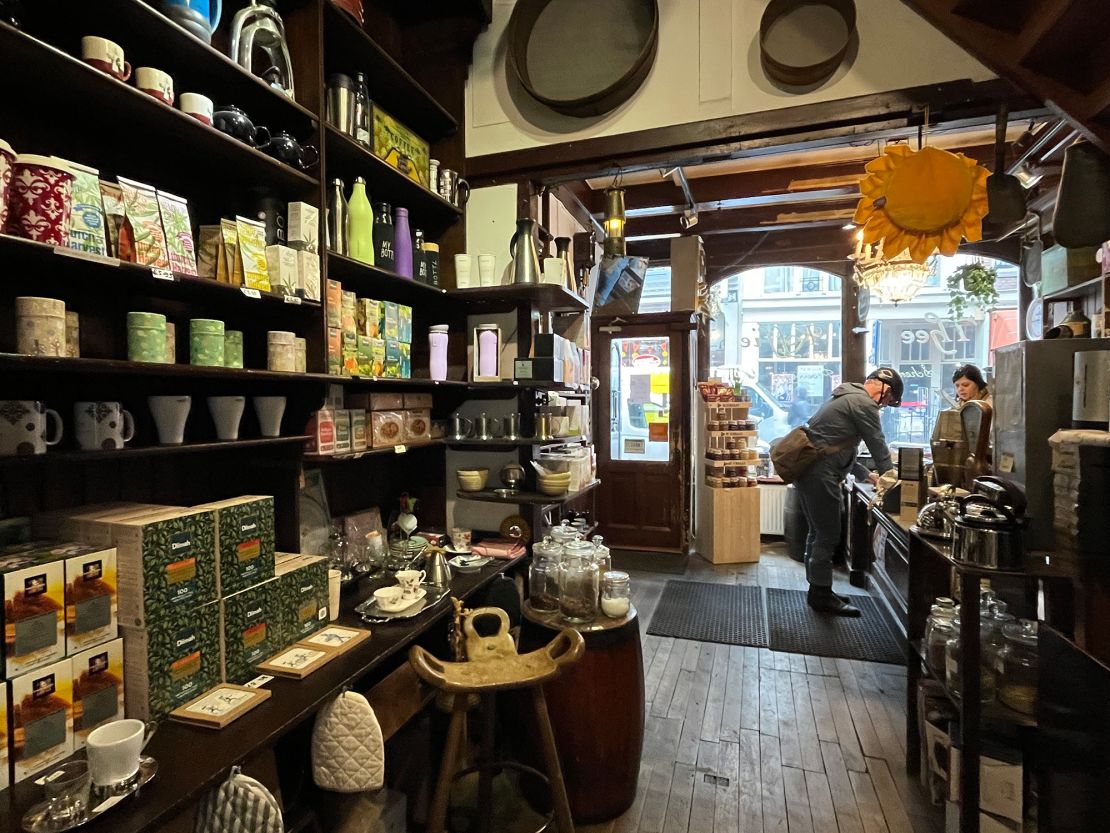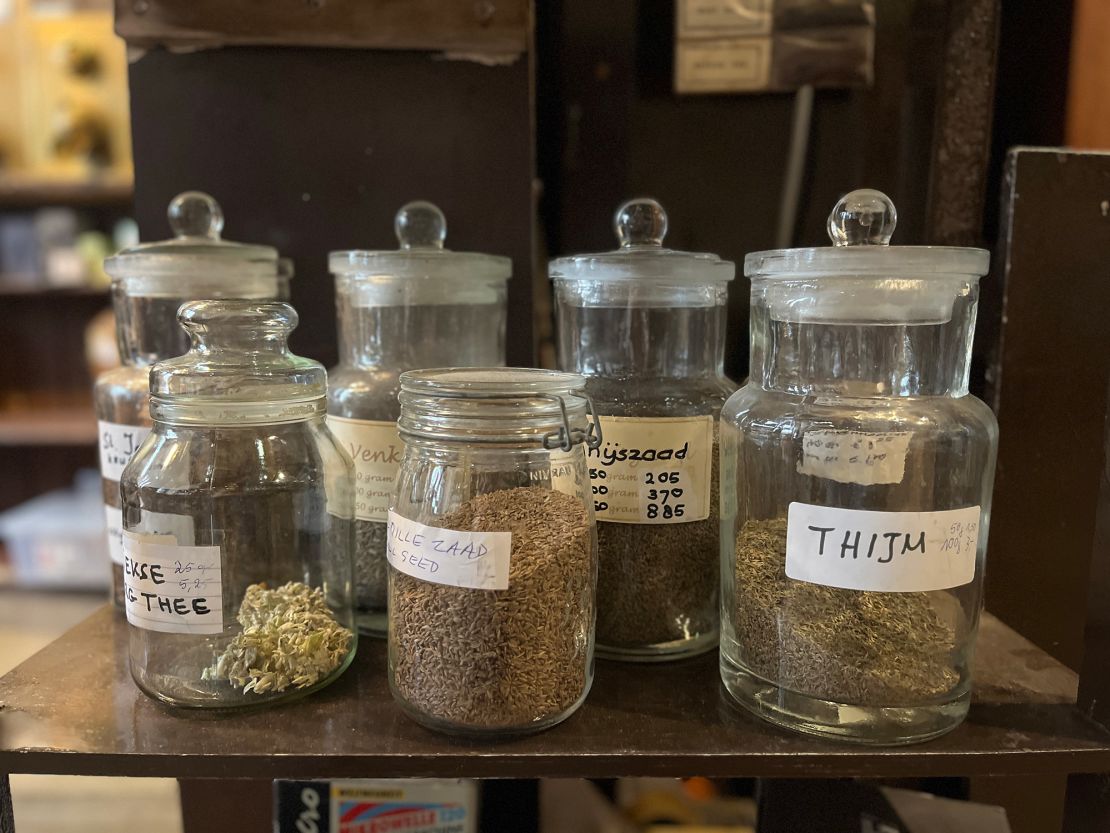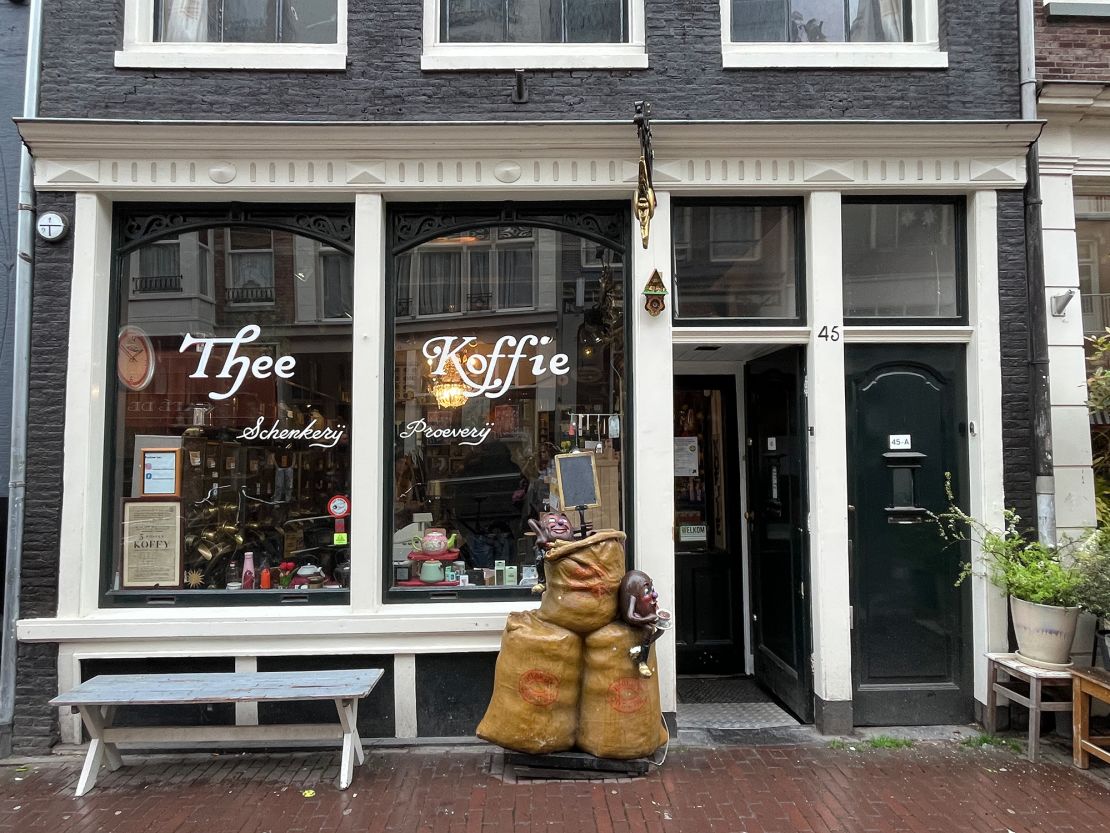Editor’s note: Sign up for Unlocking the World, CNN Travel’s weekly newsletter. Get news about destinations, plus the latest in aviation, food and drink, and where to stay.
CNN
—
On a recent chilly, drizzly afternoon in Amsterdam’s city center, a steady stream of patrons venture out of the rain and into a narrow 17th-century building on the Haarlemmerdijk, a popular shopping street. A gilded sign shaped like a shining sun hangs above the front door, reflecting the shop’s name, ‘t Zonnetje, which means “little sun” in Dutch.
A jingling bell announces every arrival. These days, it’s a mix of tourists and regular customers who come to buy coffee and tea every week or two — just as their predecessors have for nearly 400 years.
But this storied institution, beloved by Amsterdam visitors and residents alike, may not be in business much longer.
Its longtime owner, Marie-Louise Velder, has plans to close at the end of May because she can no longer stay afloat after years of skyrocketing rent — a notable setback to the preservation of the Dutch capital’s character in the ongoing tide of rising rents and gentrification, partly driven by overtourism.
Velder, 76, was born and raised in Amsterdam and has owned the shop since 1999. She told CNN she has received an outpouring of support from customers and friends since the closure was reported by Dutch newspaper Het Parool in mid-April.
She said she welcomes the opportunity to share her story with a wider audience in hopes of helping her keep ‘t Zonnetje from shuttering.
“I had a lot of phone calls, and so I think perhaps help is coming from above,” Velder, clad in a green hooded fleece, told CNN during an interview at her shop over (what else?) a cup of tea. “That’s what I hope.”
Longtime customers have expressed deep sadness over the news. Kate Carlisle, an eight-year resident of Amsterdam and a longtime visitor, first discovered ‘t Zonnetje during a trip to the Dutch capital before moving there. Carlisle had her dog with her, and she was delighted to receive “the biggest welcome” from Velder.
Carlisle now visits the shop every couple of weeks to buy coffee (which she says she leaves on her counter “a good half-day just to make the house smell better”), bonding with Velder through the years over their shared love of java and animals. She said ‘t Zonnetje’s closure would be a significant loss for the city.
“It is a heritage site, the building itself, the history behind it, the street,” Carlisle told CNN Travel. “So I’m really hoping that something can happen to start to protect this. Otherwise, it’s just going to be like strip malls. And that’s not what Amsterdam is about. That’s not why people come here.”
A tea-filled time capsule

Walking into ‘t Zonnetje, which is nestled between a flower shop and a clothing store, feels like stepping back in time. Its wooden floors are original, with shelves housing weathered tins of loose-leaf tea and spices. Dispensers of whole coffee beans from countries around the world, including Ethiopia, Portugal and Peru, stand side by side behind the counter, on which a vintage Berkel scale cuts a commanding presence.
According to ‘t Zonnetje’s entry on Amsterdam’s tourism website, the building reportedly dates to 1642 (though a book about the shop by a Dutch author and former shop owner that Velder keeps handy puts the date at 1612). The business started with “a bucket of coal, and a bucket of water and herbs,” Velder explained. “And then later on, the tea came … And then later the coffee.”
Velder pointed to a building across the street, noting that before its construction, the waters of Amsterdam’s IJsselmeer sea inlet nearly reached the shop centuries ago. “The boats were coming in here, and brought (shipments) here,” she said.
Velder purchased the business in 1999 without a contract, “just a handshake,” she says. The first few years presented a steep learning curve, but Velder, determined, said she immersed herself in learning as much as she could about the industry and what customers were looking for.
“It took me now at least five, six years until I found out what tea-drinking and coffee-drinking really was, and where I had to look and what to do and what was more important,” Velder said.
Eventually, she hit her stride, earning a reputation for high-quality products sourced from around the world. In the past, the shop has offered up to 350 varieties of tea — some made with her own “secret recipe,” Velder said — though she has cut back on placing new orders in light of the planned closure. Currently, 15 types of coffee are available.
Over the years, the shop also had an on-site cafe of sorts where patrons could linger over a cup of coffee and conversation. That feature has been closed since the pandemic, Velder said.
Even so, employees say ‘t Zonnetje remains a critical part of the true spirit of Amsterdam, a place that serves as a gathering spot for neighbors and visitors while showcasing centuries of history.
“It is more than a shop — it also has a very important social role,” explained Nathalie Teton, who has worked at ‘t Zonnetje on and off since 2021. “There were a lot of people also living alone coming here, having a cup of tea and coffee, talking with Marie-Louise. You will hear all the gossip, who is sleeping with who, and also old stories, because there were also a lot of senior people coming in.”
“Of course, there are other tea and coffee shops in Amsterdam. But they are more mainstream. This one is really unique.”
Trouble brewing

Amsterdam, which is amid a yearlong celebration leading up to its 750th anniversary this October, has been struggling for years with how to preserve its unique history as overtourism threatens to irrevocably change the character of the city.
Over the past decade, city officials have focused their tourism efforts on stemming the tourist tide and attracting the right kind of visitor to the city: those who come to appreciate Amsterdam’s museums and culture, not partake in its infamous vices.
Among those measures: increasing the tourist tax, banning tours in the historic De Wallen neighborhood, banning cruise ships and limiting the opening of shops catering specifically to tourists. However, results have been mixed, and some measures — such as a 2020 ban on vacation rentals in certain neighborhoods — have been struck down by the courts.
Meanwhile, centuries-old businesses like ‘t Zonnetje, which have long been entrenched in their local neighborhoods, remain increasingly susceptible to rising rents, as TikTok trendy eateries, generic sweet shops and “coffeehouses” that specialize in marijuana proliferate among the tourist set. In March 2023, US former boxing star Mike Tyson opened his first brick-and-mortar cannabis shop in Amsterdam, just down the street from SoHo House and W Amsterdam.
Some experts say city officials have not done enough to protect locally owned, long-established businesses such as ‘t Zonnetje. Dimitris Dalakoglou, an urban anthropologist and professor at Vrije Universiteit Amsterdam, told CNN via email that city leadership in Amsterdam and other European cities has long since “abandoned” the “prevention of this urban catastrophe.”
He warned Amsterdam is becoming “an empty façade of itself” in a 2018 article and said ‘t Zonnetje’s closure marked another “small death” for the city.
“Amsterdam’s real estate is changing fast to the benefit of capitalist profit-making: the banking sector, real estate investors and new richer inhabitants/users of the urban spaces, whilst the previous urban groups are slowly pushed away,” Dalakoglou said. “Almost every urban space’s policy goes towards this direction, even the ones which claim to aim for the opposite goal.”
Too-high rent and other struggles

Over at ‘t Zonnetje, Velder claims that the building’s landlord has steadily increased the rent, which, circa 2019, was about 18,000 euros (about $20,000) annually. In September 2024, the landlord proposed further increases, doubling the rent to about 6,000 euros (currently about $6,800) per month.
Velder took the landlord to court over that proposed increase, according to Het Parool. But even with a judge’s decision to retroactively reduce the rent to about 50,000 euros per year ($56,000), costs of the business — including payroll for four staffers — remain too high to cover with sales bringing in only about 300 euros (about $340) a day, Velder says.
Property management company Florès Vastgoedbeheer told CNN via email that the building’s landlord is not currently in the Netherlands and is unavailable for comment.
However, the email stated that the “tenant terminated the lease without any notice for her own reasons” and that “the property will become available to rent and suitable candidates can apply in due course to an estate agent to be appointed.”
Escalating rent isn’t the only challenge Velder has faced over the years.
Velder also has had disputes with a local entrepreneur who she claims offered to help the business while it was in financial trouble. A proposed deal never materialized, and the two eventually ended up in court, according to Het Parool.
In an email to CNN, Amsterdam lawyer Maarten Hilberdink, who represented Velder in various cases, described the shop’s potential closure as a “great loss for Amsterdam.”
“Marie-Louise has built something very special and it is a great pity that she had to spend her last years as an entrepreneur with legal battles and that this special store is now lost to Amsterdam,” he said.
All of these issues have taken a harsh emotional and physical toll on Velder. “I was this morning (seeing) my doctor, and (my blood pressure) was the highest I ever had, 210,” Velder said. “She said, ‘This is impossible. Your blood pressure is so high. It’s sky high.’”
A sunny attitude, despite the challenges
Despite the assorted challenges she has faced, Velder tries to maintain an upbeat attitude. She laughs easily and often, chatting with her staffers, some of whom refer to her by her nickname of “Loucky,” and customers in Dutch and English (her father was an American from Chicago). She welcomes everyone who comes into the shop — which has a 4.9 star rating on Google and 98 mostly glowing reviews — with equal enthusiasm.
However, Velder also expresses deep sorrow over the thought of closing her beloved business. “I love my customers, they are fantastic, and they love me,” she said. “This is my baby.”
Her “baby” is now struggling through a very difficult stage — and facing a highly uncertain future. It’s unclear whether or how Amsterdam’s gemeente (municipal government) would or could grant the shop protected status. In an email to CNN, the city’s tourism department said that while it “recognize[s] the significance of such changes in Amsterdam’s streetscape, matters related to the diversity and development of the local retail and hospitality offering fall outside the scope of Amsterdam&Partners.”
Longtime customers of ‘t Zonnetje, meanwhile, hope something can be done before another piece of Amsterdam’s history is lost.
“It is a jewel that needs protecting and absolutely needs support, and people shouldering in and bellying up and [doing] everything they can do to save it, because it’s one of a kind,” Carlisle said. “Amsterdam doesn’t have much of this anymore.”




